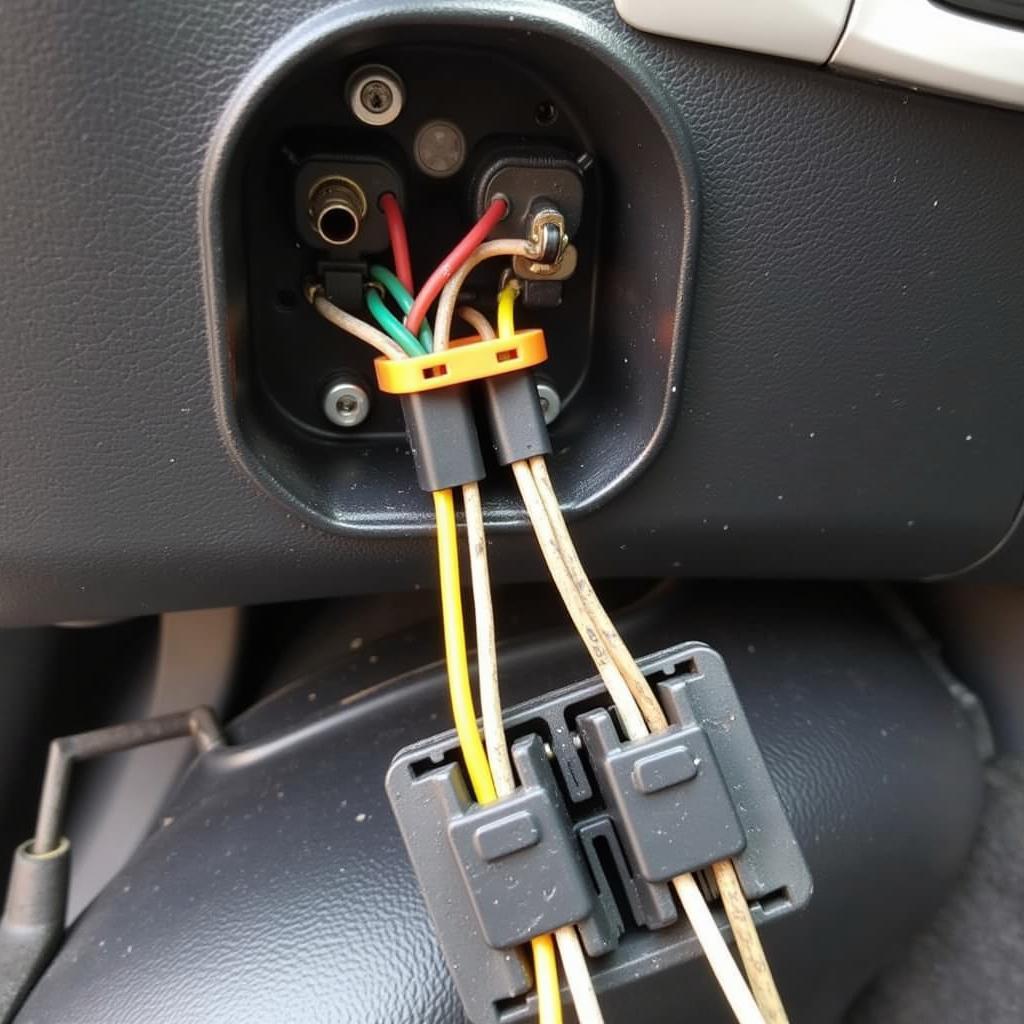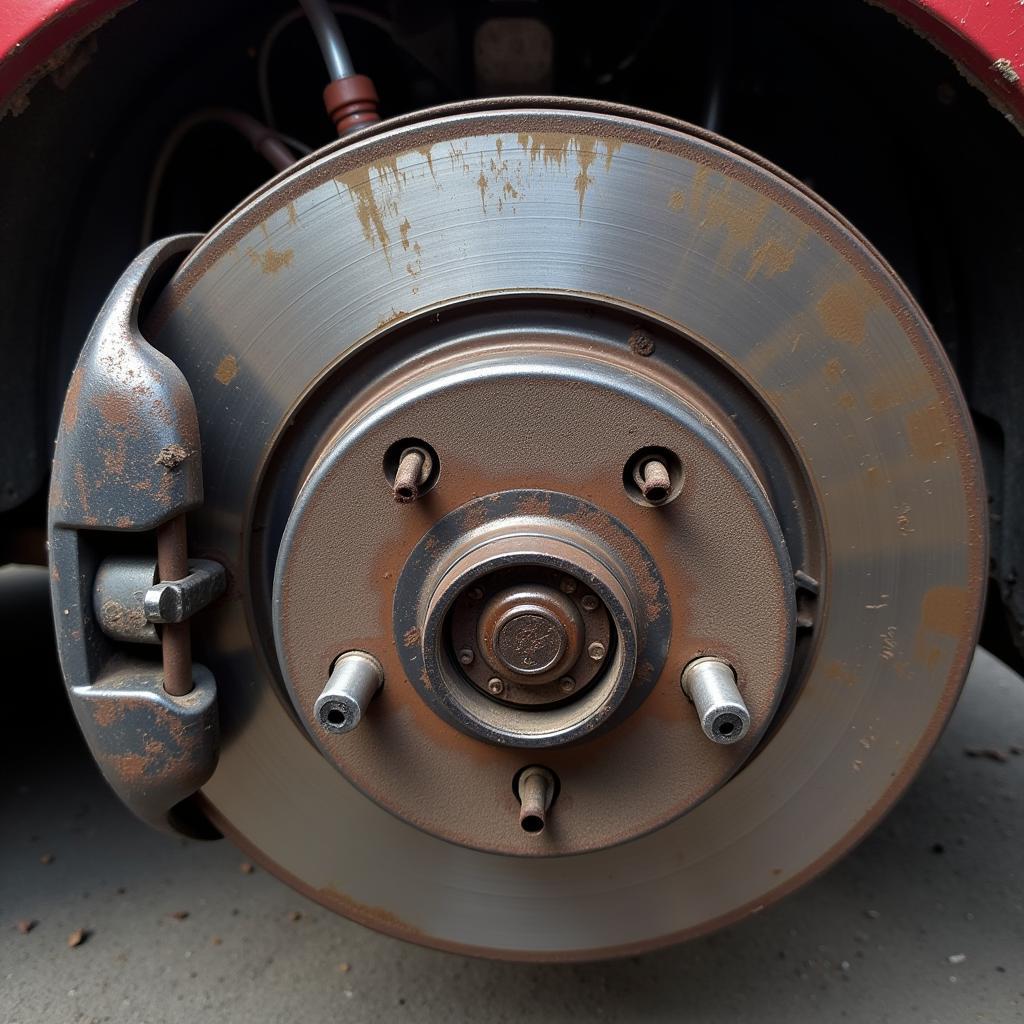A “Trailer Brake System Warning” message on your 2018 GMC Sierra’s dashboard can be a frustrating experience, especially when towing. This warning usually indicates an issue with the electrical connection between your truck and trailer or a problem with the trailer brakes themselves. This comprehensive guide will help you understand why this warning occurs and provide a step-by-step approach to diagnose and fix the problem.
Understanding the Trailer Brake System Warning
The trailer brake system is crucial for safe and controlled towing, especially with heavier loads. When the 2018 GMC Sierra detects an issue with this system, it triggers the warning message to alert you.
Several factors can activate this warning:
- Faulty Trailer Brake Wiring: Damaged or corroded wires in the trailer brake wiring harness are common culprits.
- Loose or Disconnected Wiring: Vibrations during towing can loosen connections at the trailer hitch or within the wiring harness.
- Blown Fuses: A blown fuse related to the trailer brake system will disrupt the electrical circuit, triggering the warning.
- Malfunctioning Trailer Brake Controller: Issues with the integrated trailer brake controller in your GMC Sierra can lead to a system malfunction.
- Worn Trailer Brake Components: Worn brake shoes, magnets, or drums on the trailer itself will affect braking performance and trigger the warning.
 2018 GMC Sierra Trailer Brake Wiring Harness
2018 GMC Sierra Trailer Brake Wiring Harness
Diagnosing the Problem: A Step-by-Step Guide
Before you begin, ensure your truck and trailer are parked on a level surface, the engine is off, and the parking brake is engaged.
- Check the Trailer Connection: Visually inspect the 7-pin connector on both your truck and trailer for any signs of damage, debris, or corrosion.
- Inspect the Wiring Harness: Carefully examine the trailer brake wiring harness for any visible cuts, frays, or loose connections along its length.
- Test the Fuses: Consult your owner’s manual to locate the fuse box related to the trailer brake system. Test the relevant fuses using a fuse tester or by visually inspecting them for any signs of a blown fuse.
- Inspect Trailer Brake Components: If the previous steps don’t reveal the issue, it’s time to inspect the trailer brakes themselves. Check the brake shoes, magnets, and drums for excessive wear or damage.
- Utilize Diagnostic Tools: If you have access to a diagnostic scanner, connect it to your truck’s OBD-II port to retrieve any fault codes related to the trailer brake system.
Common Solutions and Fixes
- Clean or Replace Damaged Wiring: If you find corrosion, use electrical contact cleaner and a wire brush to clean the connections. For damaged wires, replace the affected sections or the entire harness if necessary.
- Secure Loose Connections: Ensure all connections within the wiring harness and at the hitch are securely fastened. Use dielectric grease on the connections to prevent future corrosion.
- Replace Blown Fuses: Replace any blown fuses with new ones of the correct amperage rating. Remember, a blown fuse often points to a larger electrical problem, so further investigation might be needed.
- Consult a Certified Technician: If the problem persists, or if you are uncomfortable performing these checks yourself, it’s best to consult a certified GMC technician or a qualified trailer brake specialist.
2018 gmc sierra service trailer brake system warning
Additional Tips for Preventing Future Issues
- Regularly Inspect Your Trailer Brake System: Make it a habit to inspect your trailer brake wiring, connections, and components for signs of wear or damage before each towing trip.
- Keep Connections Clean and Dry: Regularly clean the 7-pin connector and trailer wiring harness connections with electrical contact cleaner and apply dielectric grease to prevent corrosion.
- Avoid Overloading Your Trailer: Towing beyond your truck’s towing capacity puts excessive strain on the trailer brake system, increasing the likelihood of problems.
Conclusion
Addressing a “Trailer Brake System Warning” in your 2018 GMC Sierra is crucial for your safety and those around you. By following the diagnostic steps and solutions outlined in this guide, you can pinpoint the problem and potentially resolve it yourself. Remember, if you encounter a persistent issue or are uncertain about any step, it’s always best to consult a qualified professional for assistance.
gmc sierra trailer brake system warning
FAQs
Q: Can I still drive my truck with the trailer brake warning on?
A: While you might be able to drive a short distance, it’s strongly discouraged. Driving with a faulty trailer brake system significantly reduces your ability to control the trailer, especially during braking, increasing the risk of accidents.
Q: How often should I have my trailer brakes serviced?
A: It’s recommended to have your trailer brakes inspected annually or every 12,000 miles, whichever comes first. However, if you frequently tow heavy loads or encounter harsh driving conditions, more frequent inspections are advisable.
Q: How do I adjust the gain on my GMC Sierra’s trailer brake controller?
A: The gain setting determines the braking force applied to the trailer brakes. You can adjust the gain using the control knob or buttons on the integrated trailer brake controller interface. Refer to your owner’s manual for specific instructions on adjusting the gain for your 2018 GMC Sierra.
Q: Can I install a trailer brake controller myself?
A: While it’s technically possible, it’s recommended to have a qualified technician install the trailer brake controller to ensure proper wiring and integration with your truck’s electrical system.
trailer brake system warning 2014 gmc sierra
Q: What is the difference between electric and hydraulic trailer brakes?
A: Electric trailer brakes use an electronic controller in the tow vehicle to activate electromagnets within the trailer brake drums, applying braking force. Hydraulic trailer brakes, on the other hand, use a surge actuator to transfer brake fluid from the tow vehicle to the trailer brakes when braking is initiated.

